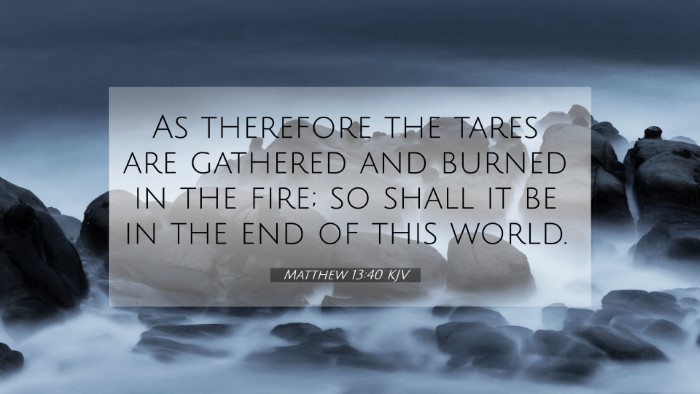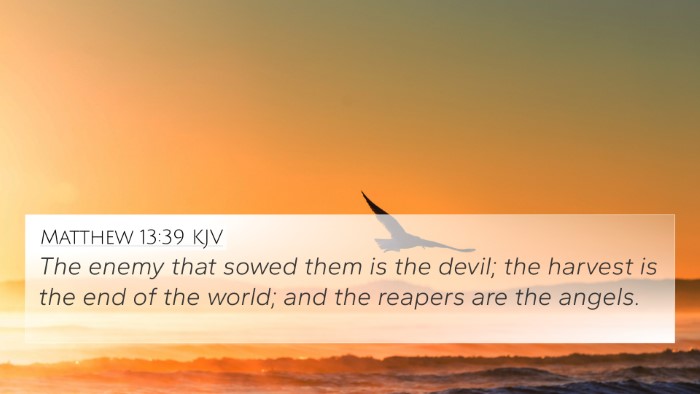Understanding Matthew 13:40
The verse Matthew 13:40 states: "As therefore the tares are gathered and burned in the fire; so shall it be in the end of this world." This teaching, part of Jesus' parable of the wheat and the tares, draws a profound connection between earthly events and spiritual truths.
Summary of Commentary Insights
General Context: Matthew Henry, Albert Barnes, and Adam Clarke provide insights that clarify this verse within the overarching theme of judgment and separation. The parable illustrates the distinction between the righteous (the wheat) and the wicked (the tares) at the end of the age.
Matthew Henry emphasizes the certainty of the final judgment. He explains that just as the tares are deliberately separated by the harvesters, so too will God separate the righteous from the unrighteous when the end comes. This separation is crucial, as it reflects divine justice.
Albert Barnes focuses on the imagery used by Jesus. He interprets the burning of the tares as a symbol of the ultimate fate of the wicked, underscoring the reality of punishment for those who reject God's ways. Barnes articulates that the reference to the "end of the world" signifies the final culmination of God's plan for humanity.
Adam Clarke, on the other hand, delves deeper into the eschatological implications of this verse. He highlights that this aspect of the parable serves as a warning and a comfort: a warning to the unrighteous of their fate, and comfort to the believers knowing that their labor in faith will not be in vain.
Cross-Referencing Biblical Texts
To fully grasp the meaning of Matthew 13:40, consider the following cross-references:
- Matthew 3:12 - "Whose fan is in his hand, and he will thoroughly purge his floor, and gather his wheat into the garner; but he will burn up the chaff with unquenchable fire." This verse reinforces the judgment imagery found in Jesus' parable.
- Revelation 14:15 - "And another angel came out of the temple, crying with a loud voice to him that sat on the cloud, Thrust in thy sickle, and reap: for the time is come for thee to reap; for the harvest of the earth is ripe." This reflects the final judgment theme and the gathering of God's people.
- 2 Thessalonians 1:9 - "Who shall be punished with everlasting destruction from the presence of the Lord, and from the glory of his power." This establishes the reality of eternal punishment, analogous to the burning of tares.
- Matthew 25:41 - "Then shall he say also unto them on the left hand, Depart from me, ye cursed, into everlasting fire, prepared for the devil and his angels." This verse complements the idea of separation and distinct fates based on one's response to God.
- John 15:6 - "If a man abide not in me, he is cast forth as a branch, and is withered; and men gather them, and cast them into the fire, and they are burned." Captures the same principle of judgment against unfruitful lives.
- Galatians 6:7 - "Be not deceived; God is not mocked: for whatsoever a man soweth, that shall he also reap." This highlights the moral law of sowing and reaping, akin to the separation of tares and wheat.
- Malachi 4:1 - "For, behold, the day cometh, that shall burn as an oven; and all the proud, yea, and all that do wickedly, shall be stubbled: and the day that cometh shall burn them up, saith the Lord of hosts, that it shall leave them neither root nor branch." This prophetic declaration aligns with the themes of judgment and purification.
Thematic Connections
Matthew 13:40 provides rich soil for exploring various theological themes. The concept of harvest can be linked to joy and fulfillment in God for the righteous, while simultaneously representing fear and dread for the unrighteous. When studying the Bible, one may utilize tools for cross-referencing to uncover deeper connections.
Using Bible Cross-References
Effective cross-referencing can enhance understanding. Here are some tips:
- Identify Themes: Look for recurring themes, such as judgment, salvation, and divine justice.
- Utilize a Bible Concordance: A concordance can help find verses that relate to significant keywords within Matthew 13:40.
- Employ a Cross-Reference Guide: Various guides can showcase how verses relate, revealing connections between Old and New Testament teachings.
Interpreting Through Cross-Referencing
Engaging in comparative Bible verse analyses allows one to understand the prophetic links between verses like Matthew 13:40 and other critical texts. Through this method, we see the unity of the Biblical narrative and God's redemptive plan, affirming that all scripture is intertwined like a seamless tapestry.
Conclusion
Matthew 13:40 serves as a reminder of the divine order and the coming judgment. By embracing cross-referencing Bible studies, believers can uncover themes that unearth the deep connections between scripture, enhancing their understanding of God’s word. The assurance of ultimate justice provides both a warning and encouragement as we navigate the moral landscape of our world.
In summary, whether through thematic Bible verse connections or linking Bible scriptures, the role of cross-references in Bible study cannot be overstated, as they ground us in truth and prepare us for the eventual reaping at the end of this age.



